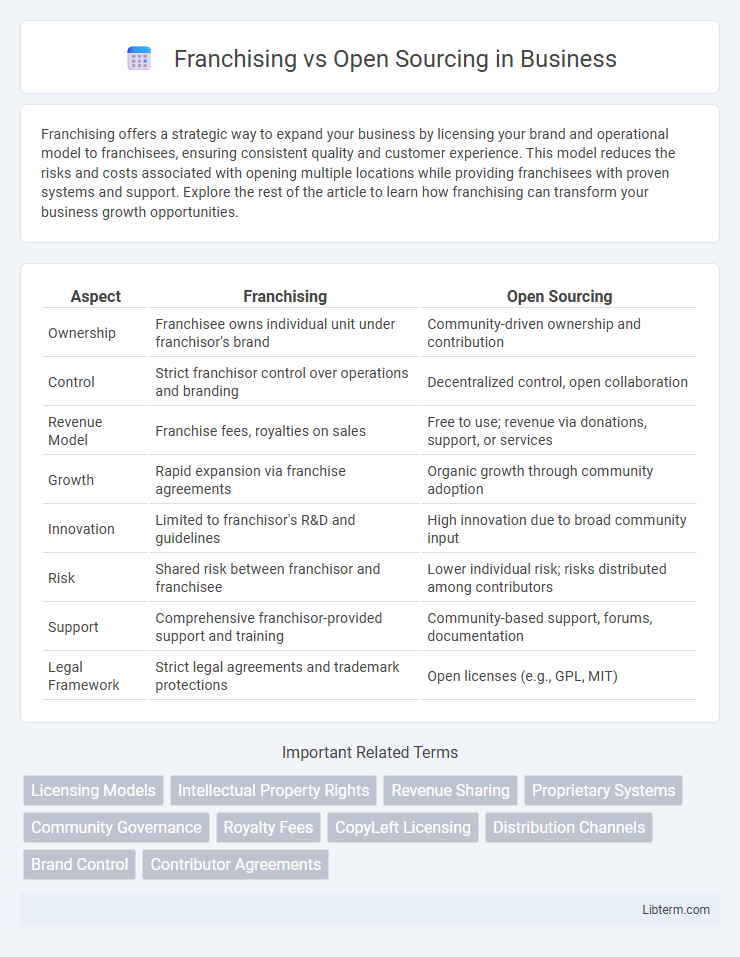Franchising offers a strategic way to expand your business by licensing your brand and operational model to franchisees, ensuring consistent quality and customer experience. This model reduces the risks and costs associated with opening multiple locations while providing franchisees with proven systems and support. Explore the rest of the article to learn how franchising can transform your business growth opportunities.
Table of Comparison
| Aspect | Franchising | Open Sourcing |
|---|---|---|
| Ownership | Franchisee owns individual unit under franchisor's brand | Community-driven ownership and contribution |
| Control | Strict franchisor control over operations and branding | Decentralized control, open collaboration |
| Revenue Model | Franchise fees, royalties on sales | Free to use; revenue via donations, support, or services |
| Growth | Rapid expansion via franchise agreements | Organic growth through community adoption |
| Innovation | Limited to franchisor's R&D and guidelines | High innovation due to broad community input |
| Risk | Shared risk between franchisor and franchisee | Lower individual risk; risks distributed among contributors |
| Support | Comprehensive franchisor-provided support and training | Community-based support, forums, documentation |
| Legal Framework | Strict legal agreements and trademark protections | Open licenses (e.g., GPL, MIT) |
Introduction to Franchising and Open Sourcing
Franchising is a business model that licenses the rights to operate under an established brand, providing franchisees with proven systems, marketing support, and ongoing training to ensure consistent customer experiences. Open sourcing involves publicly sharing software code or intellectual property to enable collaborative development, transparency, and innovation by a community of contributors. While franchising emphasizes controlled brand replication and standardized operations, open sourcing promotes decentralized collaboration and unrestricted access to creative resources.
Defining Franchising: Key Concepts and Models
Franchising is a business model where a franchisor grants the franchisee the rights to operate using the franchisor's brand, products, and operational systems, often in exchange for fees or royalties. Key concepts include brand consistency, proven business models, and ongoing support, which differentiate franchising from open sourcing's decentralized, freely shared approach. Common franchising models encompass product distribution franchising, business format franchising, and manufacturing franchising, each defining the level of control and support provided.
What is Open Sourcing? Principles and Practices
Open sourcing involves making software source code freely available for anyone to view, modify, and distribute under licenses like MIT, GPL, or Apache. Core principles emphasize transparency, collaboration, and community-driven development, encouraging contributions from diverse developers worldwide. Open sourcing practices include maintaining public repositories, using version control systems like Git, and fostering inclusive communication channels to ensure continuous innovation and improvement.
Business Growth Strategies: Franchising vs Open Sourcing
Franchising drives business growth by leveraging a proven brand model, enabling rapid market expansion through franchisee investments and standardized operations. Open sourcing accelerates innovation and market penetration by inviting community collaboration and shared development, reducing costs and enhancing product adaptability. Both strategies diversify growth pathways: franchising ensures control and consistency, while open sourcing fosters scalability and continuous improvement through collective input.
Investment and Cost Structure Comparison
Franchising typically requires a significant upfront investment, including franchise fees, royalties, and ongoing marketing costs, which create a structured but fixed expense model. Open sourcing, by contrast, minimizes initial financial outlay as the software or product is freely accessible, though it may incur indirect costs related to development, customization, and support. The cost structure in franchising is more predictable and standardized, while open sourcing involves variable expenses driven by community contributions and internal resource allocation.
Control, Ownership, and Intellectual Property Rights
Franchising grants the franchisor significant control over brand standards, operational methods, and quality, while the franchisee operates under strict guidelines, maintaining limited ownership but benefiting from established trademarks and intellectual property rights held by the franchisor. Open sourcing relinquishes exclusive control, allowing a broader community to access, modify, and distribute software or content, with ownership shared or retained by the original creators depending on the licensing model, such as GPL or MIT licenses. Intellectual property in franchising is tightly protected to preserve brand integrity, whereas open source emphasizes collaborative innovation with licensing terms that define usage rights and attribution.
Community Building in Franchising and Open Source Projects
Franchising builds community by establishing a controlled, brand-consistent network where franchisees collaborate within defined guidelines to maintain quality and customer experience. Open source projects foster community through transparent collaboration, allowing diverse contributors to innovate, share knowledge, and improve software collectively. The franchise community thrives on uniformity and brand loyalty, while open source communities emphasize openness, inclusivity, and shared ownership.
Risks and Challenges Associated with Each Model
Franchising involves significant financial risks, including high initial investment costs and ongoing royalty fees, while also facing challenges in maintaining brand consistency and operational control across locations. Open sourcing presents risks related to intellectual property protection, potential security vulnerabilities, and the challenge of sustaining community contributions and support over time. Both models require strategic management to mitigate risks: franchising demands rigorous oversight and quality control, whereas open sourcing depends on active community engagement and robust governance frameworks.
Notable Success Stories and Case Studies
Franchising success stories include McDonald's, which expanded globally by replicating its standardized business model, achieving rapid growth and consistent quality. Open sourcing boasts projects like Linux, whose collaborative development and widespread adoption drove innovation and stability in operating systems across industries. Both models demonstrate scalable growth, with franchising emphasizing control and brand consistency, while open sourcing leverages community-driven contributions for continuous improvement.
Choosing the Right Model: Factors to Consider
When choosing between franchising and open sourcing, consider control over brand and intellectual property, with franchising offering strict oversight while open sourcing promotes collaborative innovation. Assess the desired level of revenue generation and growth speed; franchising provides structured income through fees and royalties, whereas open sourcing relies on community contributions and indirect monetization. Evaluate your organization's capacity for management and support, as franchising demands extensive operational involvement, contrasting with open sourcing's emphasis on decentralized development and transparency.
Franchising Infographic

 libterm.com
libterm.com